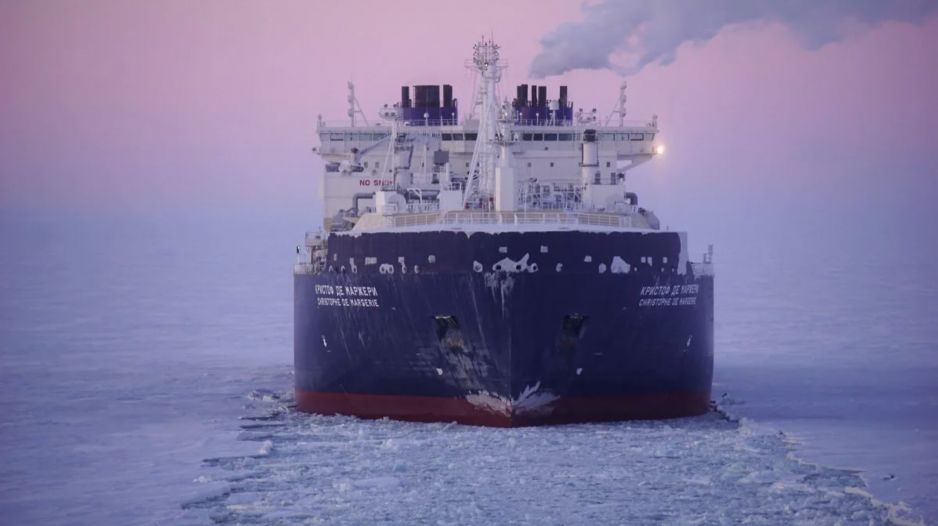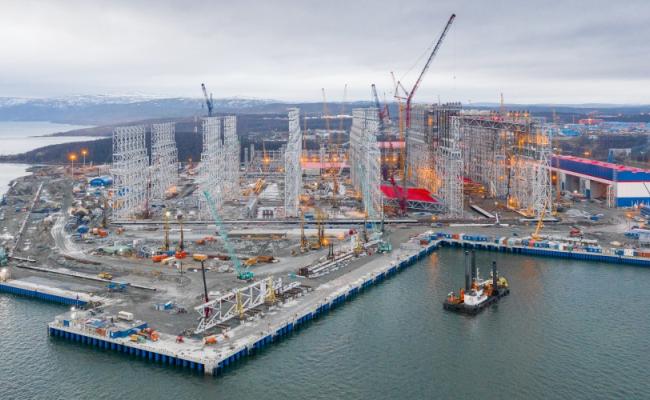Western Sanctions Could Inadvertently Redirect Russian LNG to Europe as Novatek Faces Shortage of LNG Carriers

Arc7 LNG Carrier Christophe de Margerie on Russia’s Northern Sea Route. (Source: Novatek)
Western sanctions targeting Russia’s shipbuilding sector are likely to result in greater volume of Russian LNG flowing towards Europe starting in 2023. A shortage of specialized Arc7 will redirect LNG from Novatek's latest project from Asia to Europe.
Novatek’s next Arctic LNG plant is slated to open in 2023, but due to sanctions against the Russian shipbuilding sector the gas carriers intended to transport the LNG - currently under construction at the Zvezda shipyards - will be delayed by at least one year.
Originally Novatek had aimed to deliver 80 percent of LNG from this new plant to Asia, but without a sufficient number of Arc7 LNG carriers the company will likely elect to ship its product along the much shorter route to Europe. Western sanctions targeting the shipbuilding sector could thus have the unintended consequence of sending more Russian LNG towards Europe.
Based on recent news, Novatek has managed to overcome western sanctions targeting the construction of its latest LNG plant and aims to complete its Arctic LNG 2 project largely on time. Its ship-building partner, the Zvezda shipyards in Russia’s Far East, however, face a significant delay in producing much-needed Arc7 LNG carriers
One year delay
The specialized vessels are key to transporting liquefied natural gas from the Russian Arctic to markets in Europe and Asia. Novatek and its shipping partners already operate a fleet of 15 Arc7 carriers, highly ice-capable tankers, shuttling gas from the Yamal LNG project out of the Arctic.
For Arctic LNG 2, the company had ordered an additional 21 vessels, with a contract for 15 ships going to the Zvezda shipyards and work orders for six further ships going to Daewoo Shipbuilding and Marine Engineering (DSME) in South Korea.
Also read
According to Russian industry news the first batch of five tankers at the Zvezda shipyard faces substantial delays of up to a year. Originally the first vessel was scheduled for delivery in March 2023 with subsequent ships of the first batch following in September, October, November and December 2023.
This delivery schedule aligned with the anticipated opening of the first production line of the new Arctic LNG plant.
It is unclear if subsequent batches of five vessels each scheduled for 2024 and 2026, to correspond with the second and third production line of Arctic LNG 2, will also be delayed.
The cause for the delay are western sanctions on technology exports targeting the Russian shipbuilding sector. Specifically, the sanctions target azipod propulsion units, of which each vessel uses three for high maneuverability and power levels of 51MW.
The azipods, a combination of propeller and rudder in a single unit, were originally produced through a joint venture of Rosneft and General Electric at the VRK Sapphire Plant.
Imports of Russian LNG into Europe have already grown by more than 50 percent.
It is unclear how the Zvezda shipyards plan to replace the imported units as domestic replacements are not readily available.
The six tankers constructed by DSME in South Korea will also not offer any relief as their construction was stopped in May 2022, also as a result of western restrictions.
May redirect LNG to Europe
This development challenges Novatek’s plan to export 80 percent of gas from Arctic LNG 2 to Asia. The route from the Gydan peninsula, where Arctic LNG 2 is located, to Asia is substantially longer than the trip to Europe. So in an effort to optimize the use of the existing fleet of Arc7 carriers, the company may prioritize shipments to the west.
Imports of Russian LNG into Europe have already grown by more than 50 percent in 2022 compared to previous years, especially as the flow of pipeline gas has largely subsided.
If Novatek is unable to secure a sufficient number of LNG tankers for Arctic LNG 2, experts suggest that even larger amounts of Russian LNG will flow toward Europe.
Thus, western sanctions targeting Russian ship building may have the unintended effect of greater volumes of LNG flowing towards Europe. And since liquefied natural gas is substantially more expensive than pipeline gas, Russia stands to gain financially from replacing pipeline gas with LNG.





